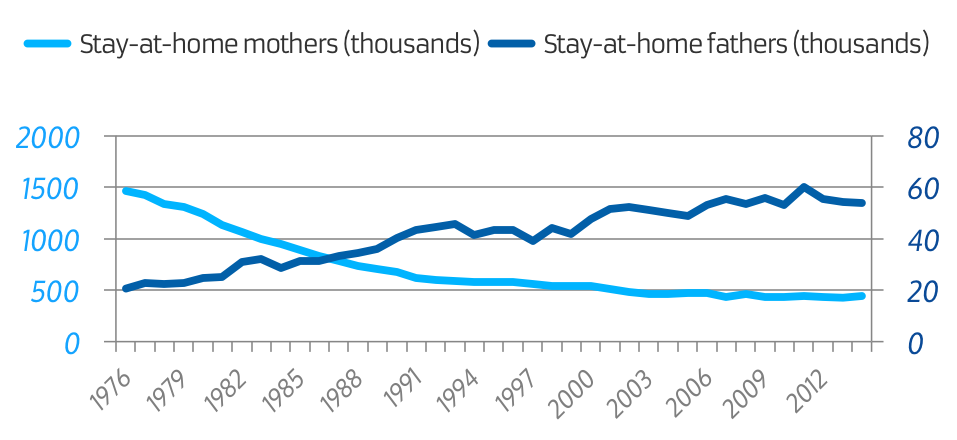There’s a lot of debate about exactly how big the gender wage gap is, and the causes of it, but it undeniably does exist.
Total Income: Men and Women in Canada
Source: Statistics Canada. Table 202-0407 – Income of individuals, by sex, age group and income source, 2011 constant dollars, annual
Many people incorrectly believe that women earn less simply because we choose less demanding careers and work fewer hours in lower-paid industries. While this is partly true, less than a third of this gap is explained by the differences in the productive characteristics of women and men, such as education level, chosen occupation or trade, work experience, number of hours worked, and sector in which we work.
The good news is that there are big cultural shifts happening now – like the growing number of men who are opting to take parental leave and be stay-at-home parents (see below) – that will affect the wage gap.
Canadian Families with Stay-at-Home Parents
Source: Statistics Canada, Labour Force Survey, 1976 to 2014
BUT – and it’s a big BUT – we don’t have to sit around waiting for the problem to fix itself (which by most estimates won’t happen for a very long time).
Women can help close the wage gap by hustling for more money. It’s not greedy. It’s not selfish. It’s business.
Yes, we have to negotiate
Most employees, if they were to ask for a raise, would get one. So why aren’t we asking?
Well, if you’ve ever felt like you you’d be penalized for asking for more money, the sad truth is that you might be. Interestingly, studies have shown that women who advocate on behalf of others tend not to be penalized the same way that they are when advocating for themselves. For more about this, we highly recommend reading Sheryl Sandberg’s book, Lean In.
While men are expected to continuously be speaking out and moving themselves forward, women have been taught by society to wait quietly until someone calls our names. Part of the reason why we don’t move ahead is because we often don’t put ourselves forward. In 20 years’ time, you don’t want to be behind on your savings because you were too polite to ask for what you deserve.
Men are expected to ask. Women, not so much. It can be difficult, on both sides of the table, to put aside those outdated lessons about gender norms. We’re all working towards it.
In the meantime, let’s talk about how you can get ahead, starting NOW.
Be Indispensable
The best way to get paid well is to be very valuable to the people who pay you. The crazy thing is that most women are already very valuable, but often neither they nor their employers acknowledge it.
Remember that being indispensable at a specific set of tasks generally means you can’t be promoted, because you’re needed right where you are. Instead, be indispensable at continuously adding value. Think of yourself as a member of the company, not as a person who does ONE job. Consider how your company can make things better, do things better, and BE better. Speak up. Engage. Train people to do your job, and ask for more responsibility – and ask for the money that this additional responsibility deserves. Explain your reasoning – why is it in the company’s best interest to pay you more to do more? Make it obvious. Oh, and if they don’t like your argument, there are plenty of other companies that absolutely will.
“Don’t assume that if you’re actively being excellent, quietly in a corner, that anyone is just going to notice you and pay you more on merit. From a business perspective, if you’ll do more for less money, why would anyone pay you more? Speak up.”
Julia
Upgrade your skills
Generally, earnings rise with education level, although this is less true for women than for men. There are now opportunities from online providers to upgrade your skills in almost any area. If you can’t afford to take time off of work to go to school, take your courses at night and on weekends. Ask people in your company, or in your personal network, to show you how they do that thing you’re interested in learning. Most people will be flattered, and will do their best to help you improve your skill set.
Show an interest in developing you, and other people will join the party.
Consider non-traditional options
More education doesn’t necessarily need to come in the form of a traditional graduate degree. If it’s been a while since you upgraded your skills, there are lots of ways to do so:
- Research specific programs that are in high demand where you live. Search LinkedIn and Craigslist to get an idea of how many openings are available and the compensation that goes along with them.
- Earn licenses and designations within your industry.
- Take some online courses – many of these are free or cheap. Check out:
Know your worth
PayScale has a great tool for calculating what your skills are worth in the market you work in. Understand your value not only on a general, market level, but also within the business and industry where you spend your time. This will help you with that logical salary negotiation discussion.
Remember: your employer will pay you as much as they think they have to – that is, just enough to keep you from leaving. It’s business.
Build your brand
An excellent reputation is the strongest possible foundation to build your career upon. Why else would prospective employers ask for references? You may look good on paper, but what really matters is what people say about you when you’re not in the room. A few words from someone who knows you can make all the difference when someone is considering hiring or promoting you.
Think about how you would like people to perceive you. What portrait do you want them to paint when they are speaking of you? Your words, behaviours, and actions feed into each person’s mental construct of who you are. It’s one of the reasons why that recommendation to “dress for the job you want, not the one you have,” exists. Create the impression in the minds of those around you that you already have the job; that you’re consistently the best candidate for that thing you want.
Know what you want other people to be saying about you. Then start acting, talking, and working just like that person. Make sure you’re in plain sight. Being amazing in a dark corner doesn’t sell you. Be amazing in the spotlight.
Don’t neglect your online brand. Google your name and see what comes up. Anything? If you don’t already have a LinkedIn profile, set one up. Even if you don’t think you need one now, it’s better to begin networking when you don’t need something. Take some time to cultivate connections and support others, and they’ll be happy to do the same when you need a warm introduction to the HR manager at your dream company.
Keep your options open
You are not married to your job. Your job is not your soulmate. While you certainly have legal obligations about protecting your employer’s interests, you may be surprised to know that your boss doesn’t really expect you to work at the same company for the rest of your life. Your next big promotion (and pay bump) may come from changing companies.
So many women feel bad about this, but we really shouldn’t. As you probably know, it’s much easier to get a job when you already have one. Here’s a hot tip: it’s much harder to ask for raise once you’re already working for the company. And yet, it seems so difficult to build up the gumption to ask the question, whether you are in initial salary discussions or if you’ve been with the same company for many years.
Identify the movers and shakers in your industry. Get to know what they’re looking for when they’re adding people to their team. Start developing yourself to have the skills, mindset, and behaviours of the A-level talent on their team. Ask them (or the people around them) relevant questions. Email addresses and phone numbers aren’t that hard to get. Always be building.
Not only does that help you create a network inside of your industry, and allow you the opportunity to spread your wings, it also improves the value that you add to your current company. Businesses need employees like you, who demonstrate interest and self-motivation. Growing your opportunities within the industry is a benefit to an employer who can recognize how to harness and make use of you.
Earn more with a side gig
Side gigs are an excellent way of earning extra income. If you have a hobby that you’re both talented at and passionate about, there’s a good chance someone will pay you to do it.
Having a side gig can make you a better employee, because you’ll likely get some outside perspective that you wouldn’t find in your day-to-day work.
Of course, if you have kids it can be difficult to find time to develop you side gig into a profitable business. But even a few hours a month can translate into more financial freedom.
Quick Tips: Things you can do right now to start making more money:
- Go check out PayScale.com. Enter your information to see where your compensation fits compared to similar roles, requiring similar experience in similar geographic areas.
- Start keeping a log of your accomplishments. If your boss is particularly busy or managing many employees, it may be hard to recollect specific examples of achievements when you do approach him or her to discuss compensation.
- Ask for opportunities to work on rock star projects, especially solo ones. Often, women don’t receive the credit they deserve when working on team projects.
- Make a list of skills that you have that could make a good side gig. When you’re first starting out, offer your services for free or cheap in exchange for a testimonial. Then take those testimonials out in the market and ask for paid opportunities.


